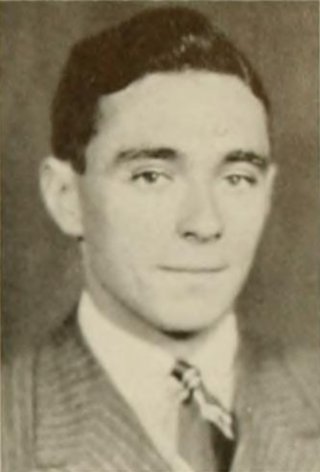
Jerome Seymour Bruner was an American psychologist who made significant contributions to human cognitive psychology and cognitive learning theory in educational psychology. Bruner was a senior research fellow at the New York University School of Law. He received a BA in 1937 from Duke University and a PhD from Harvard University in 1941. He taught and did research at Harvard University, the University of Oxford, and New York University. A Review of General Psychology survey, published in 2002, ranked Bruner as the 28th most cited psychologist of the 20th century.
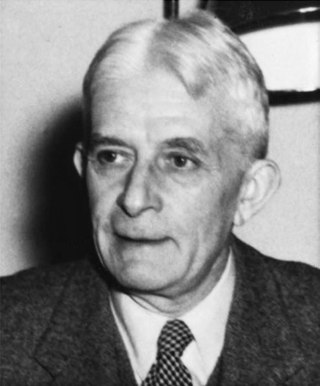
Wolfgang Köhler was a German psychologist and phenomenologist who, like Max Wertheimer and Kurt Koffka, contributed to the creation of Gestalt psychology.
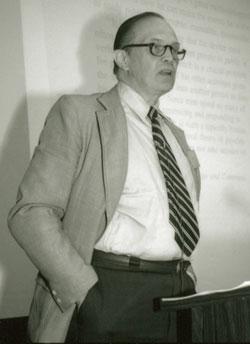
George Armitage Miller was an American psychologist who was one of the founders of cognitive psychology, and more broadly, of cognitive science. He also contributed to the birth of psycholinguistics. Miller wrote several books and directed the development of WordNet, an online word-linkage database usable by computer programs. He authored the paper, "The Magical Number Seven, Plus or Minus Two," in which he observed that many different experimental findings considered together reveal the presence of an average limit of seven for human short-term memory capacity. This paper is frequently cited by psychologists and in the wider culture. Miller won numerous awards, including the National Medal of Science.

Paul Ekman is an American psychologist and professor emeritus at the University of California, San Francisco who is a pioneer in the study of emotions and their relation to facial expressions. He was ranked 59th out of the 100 most cited psychologists of the twentieth century. Ekman conducted seminal research on the specific biological correlations of specific emotions, attempting to demonstrate the universality and discreteness of emotions in a Darwinian approach.

Nonverbal communication (NVC) is the transmission of messages or signals through a nonverbal platform such as eye contact, facial expressions, gestures, posture, use of objects and body language. It includes the use of social cues, kinesics, distance (proxemics) and physical environments/appearance, of voice (paralanguage) and of touch (haptics). A signal has three different parts to it, including the basic signal, what the signal is trying to convey, and how it is interpreted. These signals that are transmitted to the receiver depend highly on the knowledge and empathy that this individual has. It can also include the use of time (chronemics) and eye contact and the actions of looking while talking and listening, frequency of glances, patterns of fixation, pupil dilation, and blink rate (oculesics).
Kinesics is the interpretation of body communication such as facial expressions and gestures, nonverbal behavior related to movement of any part of the body or the body as a whole. The equivalent popular culture term is body language, a term Ray Birdwhistell, considered the founder of this area of study, neither used nor liked.
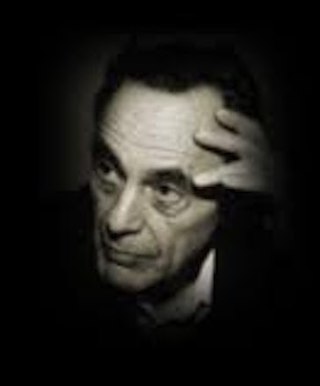
Eugene Tovio Gendlin was an American philosopher who developed ways of thinking about and working with living process, the bodily felt sense and the "philosophy of the implicit". Though he had no degree in the field of psychology, his advanced study with Carl Rogers, his longtime practice of psychotherapy and his extensive writings in the field of psychology have made him perhaps better known in that field than in philosophy. He studied under Carl Rogers, the founder of client-centered therapy, at the University of Chicago and received his PhD in philosophy in 1958. Gendlin's theories impacted Rogers' own beliefs and played a role in Rogers' view of psychotherapy. From 1958 to 1963 Gendlin was Research Director at the Wisconsin Psychiatric Institute of the University of Wisconsin. He served as an associate professor in the departments of Philosophy and Comparative Human Development at the University of Chicago from 1964 until 1995.
In philosophy, psychology, sociology, and anthropology, intersubjectivity is the relation or intersection between people's cognitive perspectives.

Social behavior is behavior among two or more organisms within the same species, and encompasses any behavior in which one member affects the other. This is due to an interaction among those members. Social behavior can be seen as similar to an exchange of goods, with the expectation that when you give, you will receive the same. This behavior can be affected by both the qualities of the individual and the environmental (situational) factors. Therefore, social behavior arises as a result of an interaction between the two—the organism and its environment. This means that, in regards to humans, social behavior can be determined by both the individual characteristics of the person, and the situation they are in.
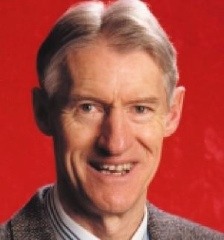
[[File:|thumb|Michael Argyle]] Michael Argyle was one of the best known English social psychologists of the twentieth century. He spent most of his career at the University of Oxford, and worked on numerous topics. Throughout his career, he showed strong preferences for experimental methods in social psychology, having little time for alternative approaches such as discourse analysis.
Albert Mehrabian is Professor Emeritus of Psychology at the University of California, Los Angeles. He is best known for his publications on the relative importance of verbal and nonverbal messages.
Michael Billig is a British academic. He is Emeritus Professor of Social Sciences at Loughborough University, working principally in contemporary social psychology although much of his work crosses disciplinary boundaries in the social sciences.

Mahzarin Rustum Banaji FBA is an American psychologist of Indian origin at Harvard University, known for her work popularizing the concept of implicit bias in regard to race, gender, sexual orientation, and other factors.

Morton Ann Gernsbacher is Vilas Research Professor and Sir Frederic Bartlett Professor of Psychology at the University of Wisconsin–Madison. She is a specialist in autism and psycholinguistics and has written and edited professional and lay books and over 100 peer-reviewed articles and book chapters on these subjects. She is currently on the advisory board of the journal Psychological Science in the Public Interest and associate editor for Cognitive Psychology, and she has previously held editorial positions for Memory & Cognition and Language and Cognitive Processes. She was also president of the Association for Psychological Science in 2007.
David Matsumoto is an author, psychologist and judoka. His areas of expertise include culture, emotion, facial expressions, nonverbal behavior and microexpressions. He has published over 400 articles, manuscripts, book chapters and books on these subjects. Matsumoto is a professor at San Francisco State University and also the director of Humintell - a company that provides "unique training in the fields of facial expression of emotion, nonverbal behavior, detecting deception and cultural adaptation." In addition, he is an 8th degree black belt in judo and the founder and program advisor of the East Bay Judo Institute in El Cerrito, California. He was most recently inducted into the 2021 United States Judo Federation (USJF) Hall of Fame which acknowledges outstanding judoka who have made significant contributions to the sport of judo.
Dermot Barnes-Holmes is a Professor of the School of Psychology at Ulster University and was Foundation Professor at the Department of Psychology at National University of Ireland, Maynooth. He is known for an analysis of human language and cognition through the development of Relational Frame Theory with Steven C. Hayes, and its application in various psychological settings. He was the world's most prolific author in the experimental analysis of human behaviour between the years 1980 and 1999. He was awarded the Don Hake Basic/Applied Research Award at the 2012 American Psychological Association Conference in Orlando, Florida. He is a past president and fellow of the Association for Contextual Behavioral Science, is a recipient of the Quad-L Lecture Award from the University of New Mexico and most recently became an Odysseus laureate of the Flemish Science Foundation and a fellow of the Association for Behavior Analysis International. In 2015 he accepted a life-time senior professorship at Ghent University in Belgium. He originally conceptualized and programmed the Implicit Relational Assessment Procedure (IRAP).

Joseph Paul Forgas is an Australian social psychologist, currently Scientia Professor at the University of New South Wales, Sydney, Australia. He was born in Budapest, Hungary and emigrated to Australia at the age of 22. He is married with two children, and lives in Sydney's Eastern Suburbs.

Marianne Schmid Mast is a Professor of Organizational Behavior and Dean of the Faculty of Business and Economics (HEC) of the University of Lausanne, Switzerland.

Nalini Ambady was an Indian-American social psychologist and a leading expert on nonverbal behavior and interpersonal perception. She was born in Calcutta, India and earned her bachelor’s degree at Lady Shri Ram College for women, Delhi University. She furthered her education by moving to the United States for her master’s degree in psychology, from the College of William and Mary, and later received her PhD in social psychology from Harvard. While completing her research at Harvard, she met her husband Raj Marphatia, who was studying at Harvard Law school.
Susan Alice Nolan is a clinical psychologist and psychology educator who studies critical thinking in the classroom, assessment in higher education, mental health, and gender disparities in STEM fields. Nolan is a professor of psychology at Seton Hall University.












